Chemotherapy has emerged as an effective treatment option for cancer. It can significantly improve patient outcomes.
Liver cancer is a growing global issue, with over 800,000 deaths in 2020 alone. Chemotherapy can be an effective treatment option for it.
Understanding the role of chemotherapy in liver cancer will also help you learn the benefits and side effects of this procedure.
So, without wasting any more time, let’s dive deep.
What are the drugs used in Chemotherapy for liver cancer and how do they work?
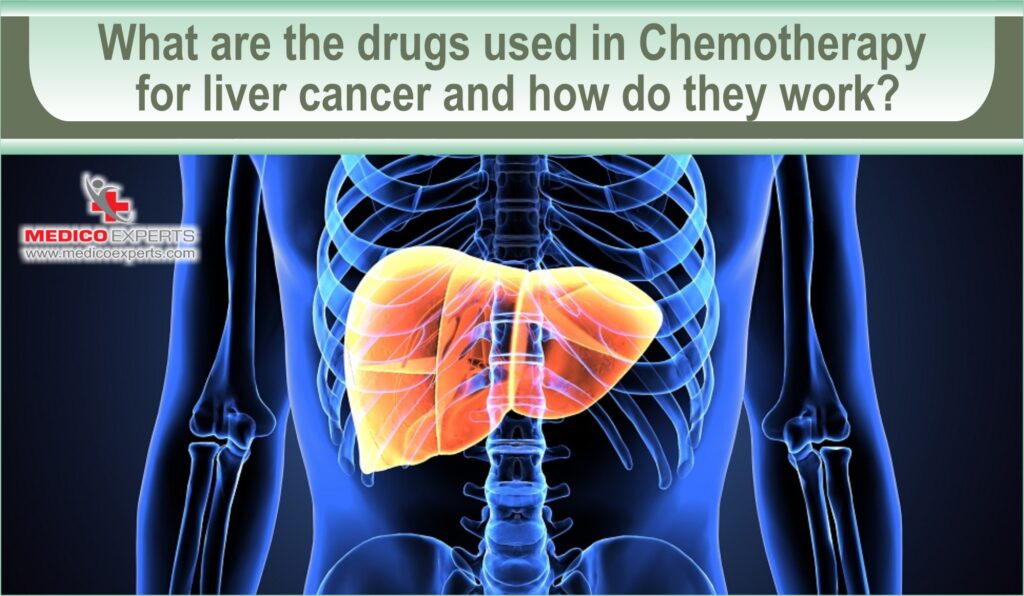
Doxorubicin, cisplatin, and 5-fluorouracil are among the chemotherapy drugs that have been effective in treating liver cancer, but they also affect healthy cells, leading to side effects
Doxorubicin is a type of chemotherapy drug that is commonly used to treat liver cancer. It works by intercalating into DNA and disrupting topoisomerase-II-mediated DNA repair (a type of DNA repair), leading to damage and death of cancer cells. Additionally, doxorubicin has been found to bind with DNA-associated enzymes, leading to apoptosis (cell death), autophagy (also a type of cell death), and necrosis of cancer cells.
5-fluorouracil (5-FU) involves the inhibition of thymidylate synthase (TS) (an enzyme involved in DNA synthesis). The conversion of 5-FU to an active form (fluorodeoxyuridine monophosphate, or FdUMP) leads to the formation of a stable complex with TS, thereby inhibiting its activity and preventing the synthesis of new DNA.
Combination of chemotherapeutic drugs for liver cancer
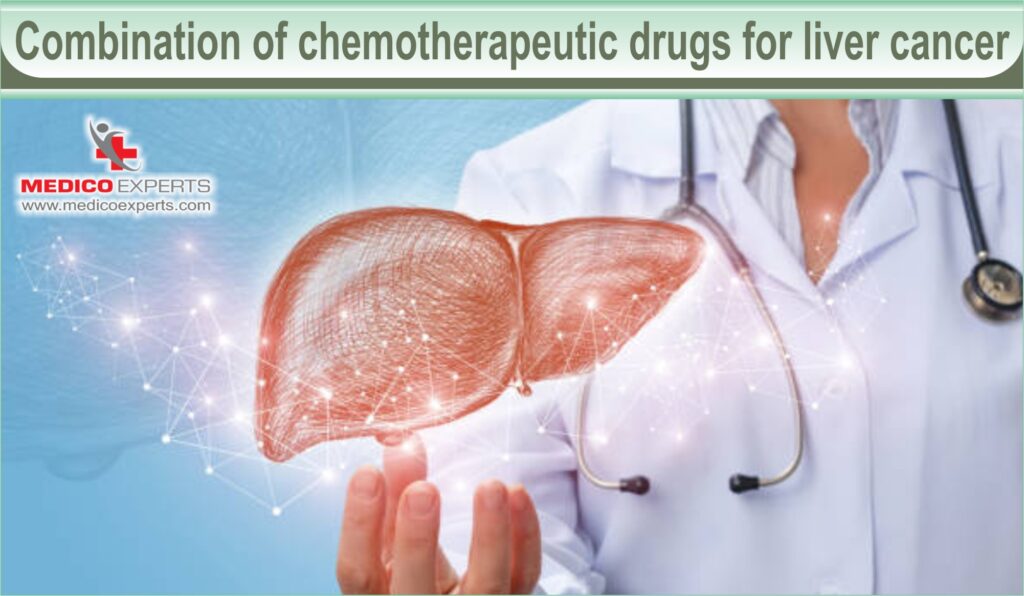
Gemcitabine plus oxaliplatin (GEMOX) is a chemotherapy drug combination that has been used to treat liver cancer.
Gemcitabine and oxaliplatin have different and complementary mechanisms of action. Gemcitabine works by interfering with DNA synthesis during the S-phase of the cell cycle (the S phase is the DNA synthesis phase of the cell cycle) and by causing the death of cancer cells, while oxaliplatin works by interacting with DNA to prevent it from replicating properly, leading to programmed cell death.
The use of both drugs in combination may enhance the overall effectiveness of treatment by targeting different stages of cancer cell growth and survival.
MedicoExperts tumor board can help you in choosing the right kind of chemotherapy and improve your survival chance.
Systematic administration of Chemotherapy for liver cancer:
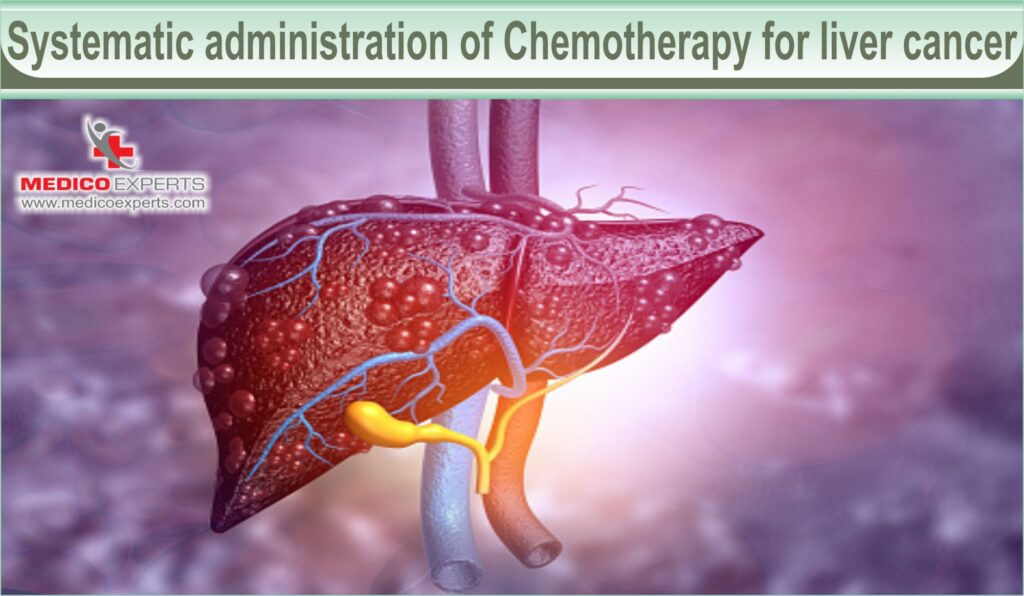
Here are the various ways chemotherapy is administered for liver cancer.
- Oral administration – some chemotherapy drugs can be taken orally in the form of pills or capsules.
- Intramuscular (IM) administration – although not commonly used for liver cancer treatment, some chemotherapy drugs can be injected directly into the muscle tissue.
- Subcutaneous (SC) administration – some chemotherapy drugs can be injected under the skin, either in the abdominal area or the thigh.
- Ultrasound-targeted microbubble destruction – this method uses ultrasound to disrupt microbubbles containing chemotherapy drugs that are injected systemically into the bloodstream, allowing for targeted drug delivery to the tumor site while minimizing damage to healthy tissue.
Regional administration of Chemotherapy drugs in liver cancer
The method involves delivering chemotherapy drugs directly to the liver region, allowing for targeted drug delivery to the tumor site while minimizing the exposure to healthy tissues.
Therefore, regional administration of chemotherapy drugs may be an effective treatment option for patients with liver cancer, especially those with tumors that are confined to the liver. Additionally, the specific method used and the drugs administered will depend on the individual patient’s case.
Administration of drugs in the hepatic artery
Administering drugs through the hepatic artery is a common regional administration method used for liver cancer treatment. Hepatic artery infusion (HAI) is a type of intra-arterial drug delivery that involves delivering chemotherapy drugs directly to the liver through the hepatic artery.
Studies have shown that hepatic arterial infusion chemotherapy is an effective approach for the treatment of advanced hepatocellular carcinoma (HCC) and can improve overall survival in patients with this condition.
Additionally, chemoembolization, which involves the administration of chemotherapy drugs followed by the blocking off of the hepatic artery with embolic particles, is another method that can be used in the hepatic artery for the treatment of liver cancer.
The different methods of drug delivery chosen by the MedicoExperts tumor board will help in shrinking the size of the tumor and reducing the side effects as much as possible.
Side effects of liver cancer drugs
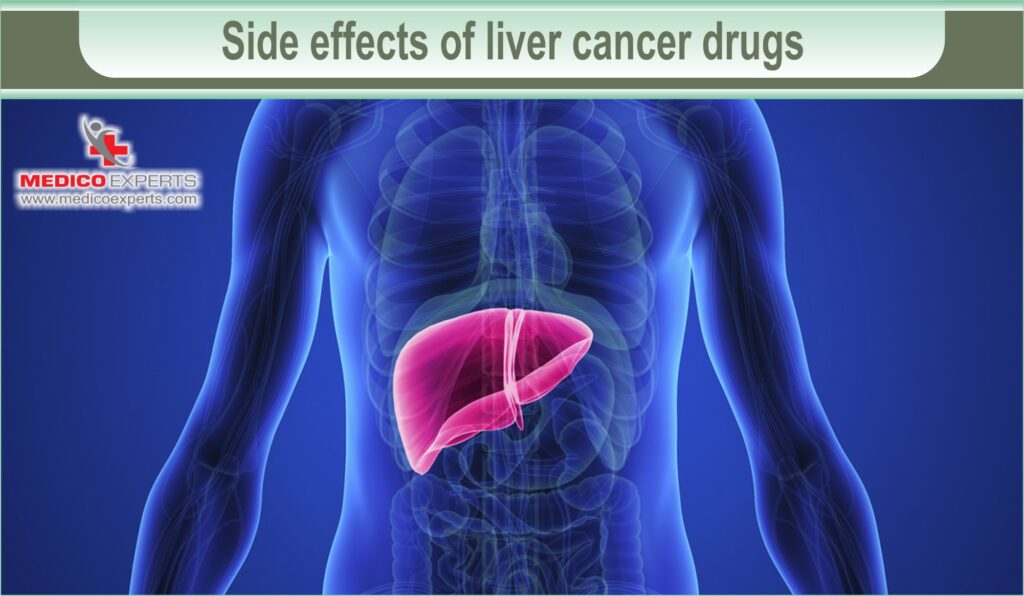
Some possible side effects of liver cancer drugs may include:
- Fatigue
- Loss of appetite
- Nausea and vomiting
- Diarrhea
- Hair loss
- Mouth sores
- Increased risk of infection
- Extreme tiredness
- Pain after the procedure
It is important to note that the specific side effects of liver cancer drugs can vary based on the drugs used and the individual patient’s response to treatment.
Age as a factor for liver cancer chemotherapy
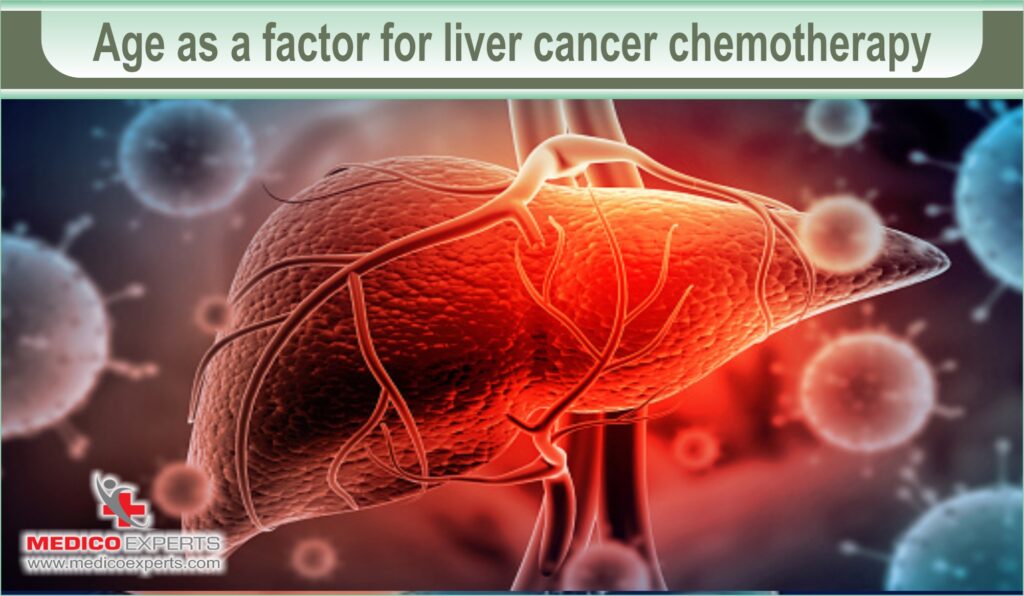
The age for liver cancer chemotherapy can vary depending on the specific type of liver cancer and the individual patient’s case.
Some studies have shown that hepatic arterial infusion chemotherapy can be effective in the treatment of advanced hepatocellular carcinoma, which is the most common type of liver cancer, in both older and younger patients.
However, as patients get older, their liver function may decrease, which can have an impact on how well their liver can process and respond to chemotherapy drugs.
Additionally, age can be a factor when considering the overall health and medical history of the patient, as older patients may have other health conditions that can affect their ability to tolerate chemotherapy. Therefore, the specific age range for liver cancer chemotherapy will depend on the individual patient’s case.
Outcome of chemotherapy in liver cancer
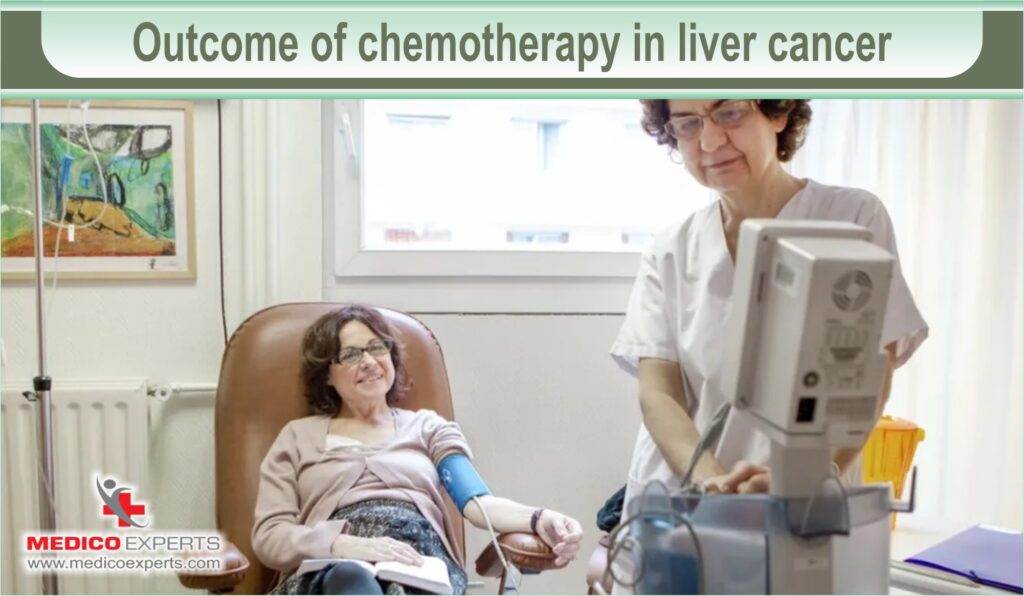
The outcome of liver cancer chemotherapy can vary depending on the specific type and stage of liver cancer, as well as the individual patient’s response to the treatment.
Hepatocellular carcinoma (HCC) is the most common type of liver cancer, and recent advances in chemotherapy have shown that a combination of drugs may be more effective than single-agent chemotherapy for the treatment of this disease
One study showed that patients with HCC who received a combination of chemotherapy drugs had a better response rate and longer progression-free survival compared to those who received single-agent chemotherapy.
However, chemotherapy drugs used for liver cancer do not always have a good effect on the disease, and patients can experience a range of side effects from treatment, including nausea, vomiting, and fatigue.
In some cases, chemotherapy may be used in combination with other treatments, such as surgery, radiation therapy, or targeted therapy, to improve outcomes of liver cancer treatment.
Liver Cancer Chemotherapy – Role of MedicoExperts Tumour Board
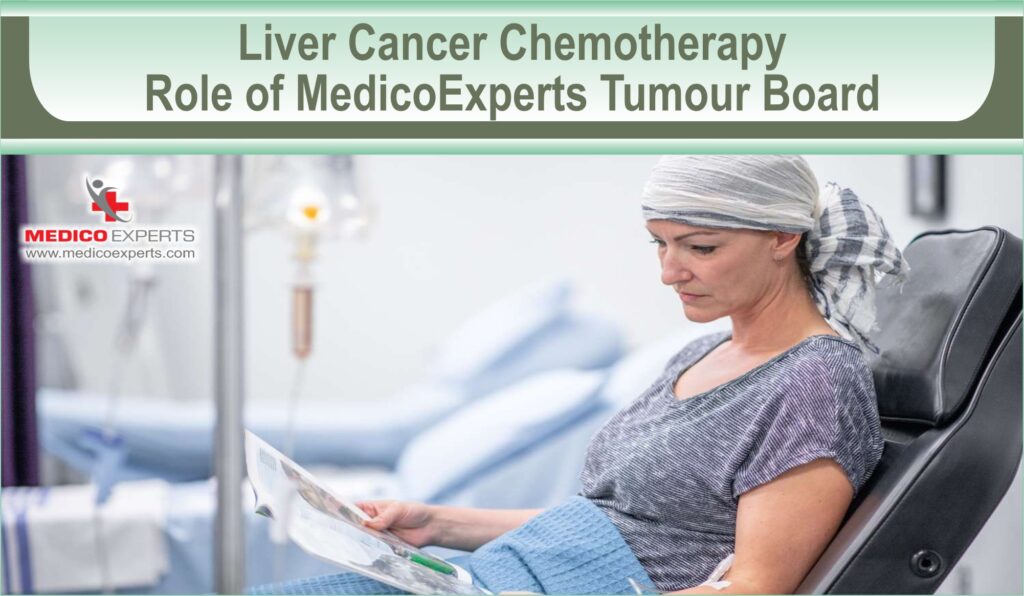
MedicoExperts tumor board is a team of healthcare professionals with different areas of expertise who work together to determine the best possible treatment plan for patients with cancer, including liver cancer.
This team typically includes medical oncologists, surgical oncologists, radiation oncologists, pathologists, radiologists, and other specialists as needed. The tumor board team conducts regular meetings to review each patient’s treatment options and to discuss the potential benefits and risks of each option.
Additionally, the tumor board team also considers important factors such as the patient’s health, medical history, and personal preferences while designing the treatment plan. The involvement of a tumor board in the treatment of liver cancer can help ensure that the patient receives comprehensive, coordinated care that is tailored to their specific needs.
This can be particularly important in the case of liver cancer, which may require a multidisciplinary approach to achieve optimal outcomes.
Conclusion
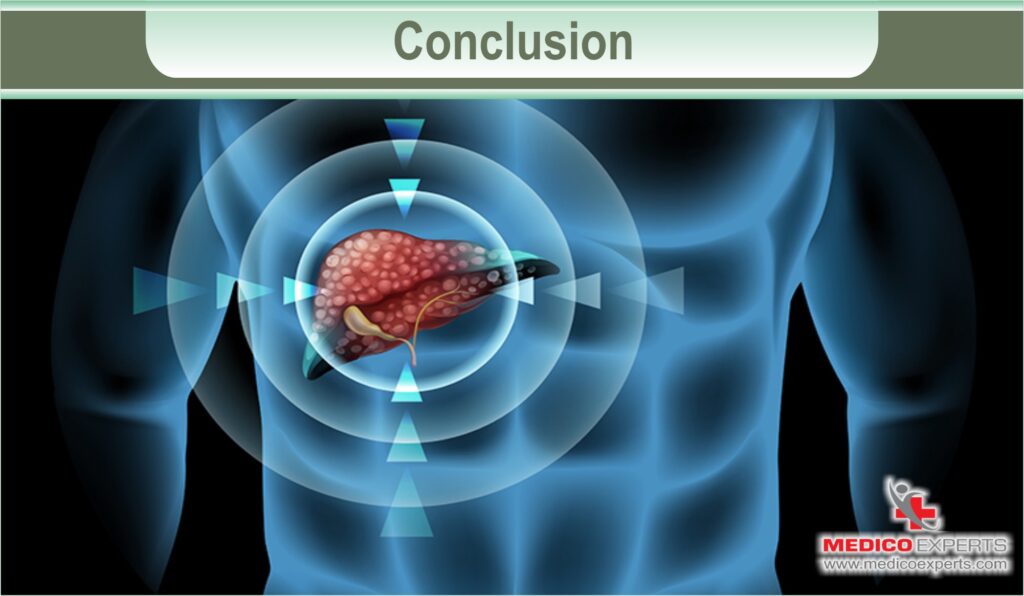
Chemotherapy is an effective treatment choice for liver cancer, especially in the early stages of the disease when it is potentially curable.
However, the management of liver cancer depends on a variety of factors, including tumor location, patient health, and medical history.
In some cases, liver cancer may require a multidisciplinary approach that involves surgery, local destructive procedures, and radiation therapy.
There may also be options for hepatic arterial infusion chemotherapy in the treatment of liver cancer, although this may vary based on the specific cancer type and stage.
However, the decision to pursue chemotherapy treatment for liver cancer should be individualized for each patient based on their specific cancer type
Chemotherapy may be able to slow down the progression of the cancer, shrink tumors, and alleviate certain symptoms associated with liver cancer. However, the effectiveness of chemotherapy in curing liver cancer may vary greatly, and a complete cure may not always be possible with chemotherapy alone. Other treatment options such as surgery, radiation therapy, and targeted therapy may also be used in combination with chemotherapy to treat liver cancer.
FAQ :
Q1. Can liver cancer be cured with chemotherapy?
A: Hepatic artery infusion chemotherapy can have a positive impact on the lives of patients with liver cancer.
Q2. Can chemo help stage 4 liver cancer?
A: Once the liver has spread to other organs it cannot be treated with surgery, instead chemoembolization can help treat metastatic liver cancer.
References
https://www.ncbi.nlm.nih.gov/pmc/articles/PMC9738136/
https://www.ncbi.nlm.nih.gov/pmc/articles/PMC8891602/
https://www.cancer.gov/about-cancer/treatment/drugs/liver
https://www.ncbi.nlm.nih.gov/pmc/articles/PMC5545136/
https://www.ncbi.nlm.nih.gov/pmc/articles/PMC8546455/
https://pubmed.ncbi.nlm.nih.gov/17330837/
https://www.ncbi.nlm.nih.gov/pmc/articles/PMC10366803/



